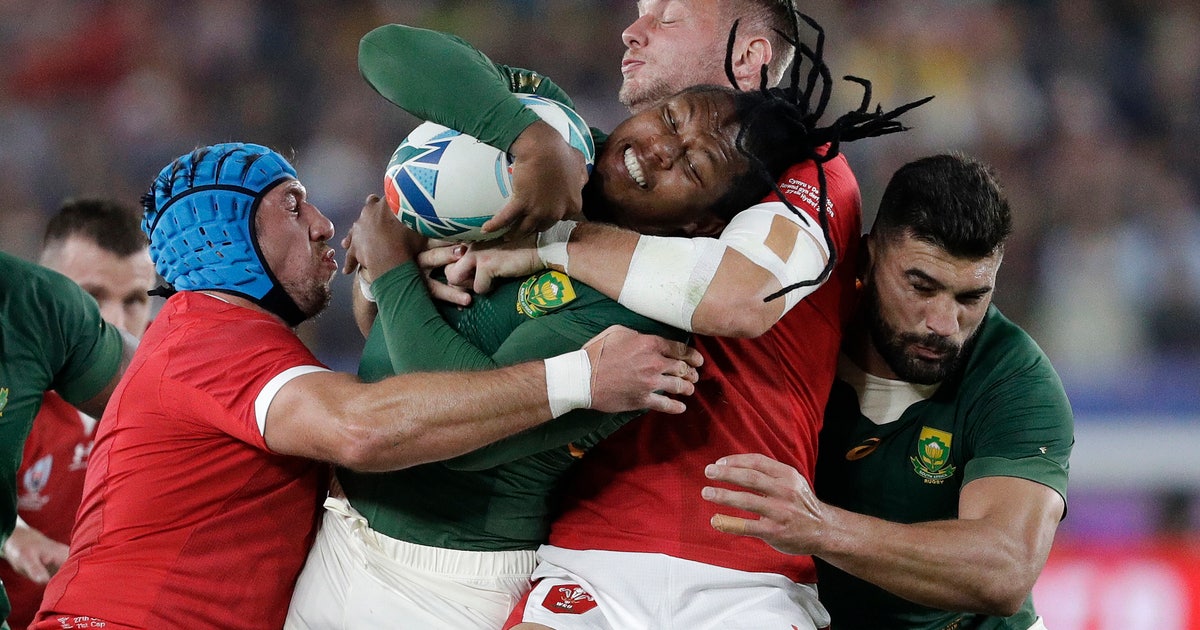Expect Boks to do what they do best in Rugby World Cup final


TOKYO (AP) — The Springboks have picked the bits they liked out of Warren Gatland’s advice on how South Africa will have to play to beat England in the Rugby World Cup final.
They’ll likely ignore the main theme.
Gatland guided Wales to a Six Nations Grand Slam title this season, including a 23-13 win over England, playing with a low-risk, stultifying strategy that may appeal to the rugby purists but can bore casual viewers.
After Wales’ 19-16 loss to South Africa in a grinding semifinal match on Sunday night, Gatland suggested the Springboks will have to play an expansive game to beat England on Saturday. In rugby parlance, that means attacking and moving the ball wide.
“It’s good that he thinks we can go all the way — that’s great!” Springboks coach Rassie Erasmus said. “We are a team that’s been together for 25 test matches, and we do play teams with different styles.”
Same-same, but different.
The Springboks have won two World Cup titles without scoring a try in the final. In 1995, they won 15-12 with an extra-time dropped goal by Joel Stransky, and it was 15-6 — five penalties to two — over England in 2007.
They’ve gone back to a traditional Springboks style this season under Erasmus and, so far, it has worked for them.
England’s 19-7 win over two-time defending champion New Zealand on Saturday was widely acclaimed as much for the line-speed and physicality in defense as the unexpected dominance at the breakdown which threw the All Blacks off and furnished the backline with opportunities. The All Blacks went in as deserving favorites, having lost just nine of their previous 105 tests, and as the leading exponents of the running game.
That didn’t work for the New Zealanders against an England squad that is guided by former Australia coach Eddie Jones. It has former All Blacks coach John Mitchell orchestrating the defense and another Australian, Scott Wisemantel, organizing the attack. England’s scrum coach, Neal Hatley, grew up in South Africa and played for the University of Natal.
The All Blacks beat the Springboks 23-13 in the pool phase last month — scoring two tries in four-minute span that broke open an otherwise tight game. That came after the Springboks held the All Blacks to a 16-16 draw in the New Zealand capital in July on the way to their Rugby Championship title.
“We’re still in a phase where if we suddenly have to adapt — a team like New Zealand with a fast, running game — we’re used to that,” Erasmus said. “If we play a team like Wales who play a long-distance kicking game, it’s difficult for us to run from our own 22.
“Yes, I think (Gatland) is right— there are definitely some areas in our game that we must improve if we want to win. But we have given ourselves a chance.”
That could be read as saying South Africa is in the final for the third time; Wales missed its chance for the third time.
Wales had beaten the Springboks in all four meetings between the World Cups, bookended by South Africa’s quarterfinal win in 2015 and the semifinal win in Yokohama.
“When we analyzed the way they won the Six Nations, we could see that they are a team that really strangle the life out of the opposition,” Erasmus said. “We had to match that. It probably wasn’t a spectacle, but we expected that. The boys stuck to their guns and adapted.”
Wales was playing for territory, and sweating on mistakes. The Welsh had 61% of the possession, carried the ball 111 times — 40 more than South Africa — but made only 189 meters with it. There were a combined 81 kicks in general play, primarily box kicks and high bombs to set up aerial contests.
England, the 2003 champion, also can go to a direct style. Like the Springboks, there’s great pride in the scrum, a forward pack aiming to dominate physically and tactical kicking options.
England and South Africa are 2-2 in the last 18 months, Erasmus pointed out, “so we are accustomed to the way they play.”
The England coaches Jones and Mitchell were in the stadium watching South Africa-Wales, and left knowing the Boks will be prepared to muscle up again.
England is “much better than when we last played them — you could see it last night, the way they dismantled New Zealand,” Erasmus said. “But … I’m not 100% sure that a World Cup final will be won by a very expansive gameplan and wonderful tries.”





